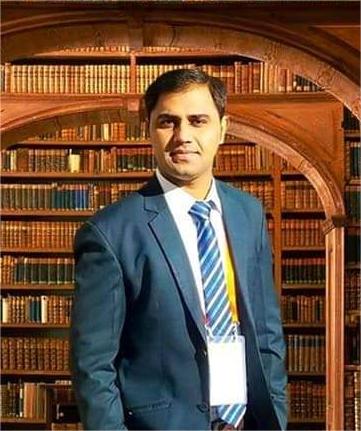
2025 International Conference on Artificial Intelligence and New Productivity
May 18-19, Wuhan, China
Keynote Speakers

Professor, Hossam A. Gabe, Fellow IET, Distinguished Lecturer-IEEE NPSS
Director of Smart Energy Systems Lab, Ontario Tech University, Canada.
Biograpgy:
Dr. Gabbar is a full Professor in the Department of Energy and Nuclear Engineering, the Faculty of Engineering and Applied Science, at Ontario Tech University (UOIT), where he has established the Energy Safety and Control Lab (ESCL), Smart Energy Systems Lab, and Advanced Plasma Engineering Lab. He is the recipient of the Senior Research Excellence Aware for 2016, UOIT. He is recognized among the top 2% of worldwide scientists with high citation in the area of energy. He is a Fellow IET (FIET) and a Distinguished Lecturer – IEEE NPSS on Nuclear-Renewable Hybrid Energy Systems and Plasma-based Waste-to-Energy. He is leading national and international research in the areas of smart energy grids, energy safety and control systems, and waste-to-energy using advanced plasma technologies. Dr. Gabbar obtained his B.Sc. degree in 1988 with first class of honor from the Faculty of Engineering, Alexandria University (Egypt). In 2001, he obtained his Ph.D. degree from Okayama University (Japan). From 2001 till 2004, he joined Tokyo Institute of Technology (Japan), as a research associate. From 2004 till 2008, he joined Okayama University (Japan) as an Associate Professor, in the Division of Industrial Innovation Sciences. From 2007 till 2008, he was a Visiting Professor at the University of Toronto. He also worked as process control, safety, and automation specialist in energy and oil & gas industries. Dr. Gabbar has more than 230 publications, including patents, books / chapters, journal and conference papers.
Speech Title:
Collaborative Simulation for Net-Zero and Hydrogen Deployment Planning
Abstract:
In this talk, collaborative simulation tool will be presented to demonstrate the utilization to plan hydrogen deployment in municipalities and community applications. The concept of energy semantic network is utilized to model energy networks and interconnected infrasturctures while defining key performance indicators. The collaborative tool is demonstrated using case studies with energy, nuclear, transportation, hydrogen, and water networks as interfaced with infrastructures.

Professor, Wenfeng Wang,
College of Sciences, Shanghai Institute of Technology, China
International Academy of Visual Arts and Engineering, UK
Biography:
Professor Wang is currently the Chief Professor at International Academy of Visual Arts and Engineering, UK and a professor in Shanghai Institute of Technology, China. He is the editor in chief of an ESCI-indexed journal - International journal of Applied Nonlinear Science (IJANS). He is also a tenured professor in IMT Institute in India, where he served as one editor in chief of International Journal of Electrical and Electronics Engineering (IJEEE) and the director of Sino-Indian Joint research center of artificial intelligence and robotics. He was selected as a key tallent in Chinese Academy of Sciences in 2018 and one of the "Hundred People in Intelligent Era" by the China Association for Science and Technology. He is the evaluation expert for the National Excellent Youth Fund. Prof. Wang is very influential in applied computational science and machine learning. He is a reviewer of many top SCI journals - Water Research, Science China-Information Sciences, Science of the Total Environment, Environmental Pollution, IEEE Transactions on Automation Science and Engineering and etc. He were ever recommended as effective candidates of AE/SE for Nature Computational Science in 2021 and Nature Communications (machine learning direction) in 2023.
Speech Title:
Intelligence in new productivity and its implications to decision science
Abstract:
Decision science is experiencing an evolution driven by machine intelligence and the optimized productivity. Theoretically, intelligent decision has been conjectured as the fourth intelligence layer in the machine brain. Such theory were developed from deep multiview active Learning, broad learning and robust metalearning technologies for rapid classification in large-scale decisions. Applications of intelligence in decision science attracted much attention. Especially in clinical decisions, real-time and precise decisions improved the cure rate of many patients. Since Al is already an important tool to assist people in decision-making, we should manage and undoubtedly ensure the fairness and inclusiveness of AI. It is very important to consider whether AI will have a more adverse impact on the vulnerable groups when making intelligent decisions, especially those with high influences.

Assistant Professor, Azhar Imran Mudassir,
Faculty of Computing & Artificial Intelligence, Air University Islamabad, Pakistan
Biography:
Dr. Azhar Imran Mudasir is an Assistant Professor at the Department of Creative Technologies, Faculty of Computing & Artificial Intelligence, Air University, Islamabad, Pakistan. He has completed his doctoral degree in Software Engineering from the Beijing University of Technology, China, and his master's degree in Computer Science from the University of Sargodha, Pakistan. He worked as a Senior Lecturer at the Department of Computer Science, University of Sargodha, Pakistan, from 2012 to 2017. He is a renowned expert in Image Processing, Healthcare Informatics, and Social Media Analysis. He is a regular member of IEEE and has contributed with 60+ research articles in well-reputed international journals and conferences. He is the editorial member and reviewer of various journals, including IEEE Access, MDPI Cancers, Applied Sciences, Mathematics, Springer Visual Computer, Talyor and Francis: Biomedical Imaging and Visualization, Multimedia Media Tools & Applications, IGI Global and Journal of Imaging, etc. Dr. Azhar has over 12 years of national and international academic experience as a Full-Time Faculty, teaching Software Engineering and core computing courses. Dr. Azhar has delivered guest talks and conducted seminars and trainings at numerous national and international forums in the past. He has contributed to multiple international conferences in diverse roles (keynote speaker, technical/ committee member, registration, speaker, etc.). His research interests include Image Processing, Social Media Analysis, Medical Image Diagnosis, Machine Learning, and Data Mining. He aims to contribute to interdisciplinary research of computer science and human-related disciplines.
Speech Title:
The Role of AI in Healthcare:- Hope v/s Hype
Abstract:
As advancements in artificial intelligence (AI) continue to permeate every facet of society, the healthcare industry stands on the precipice of a profound transformation. In this keynote address, we delve into the delicate balance between hope and hype surrounding AI's integration into healthcare. We examine the tangible breakthroughs that AI has enabled, from personalized treatment plans to predictive analytics, while also scrutinizing the exaggerated expectations and ethical considerations that accompany its implementation. Through insightful analysis and real-world examples, we navigate the intricate landscape of AI in healthcare, offering valuable perspectives for stakeholders, practitioners, and policymakers alike. Join us as we explore the promise and pitfalls of AI, seeking to harness its full potential in advancing the delivery of quality care while mitigating the risks of overestimation and disillusionment.
AINP 2025
https://ainp.zkconfer.com/
The AINP 2025 organizing committee encourages you to invite colleagues to attend and submit original research for the conference. ![]()